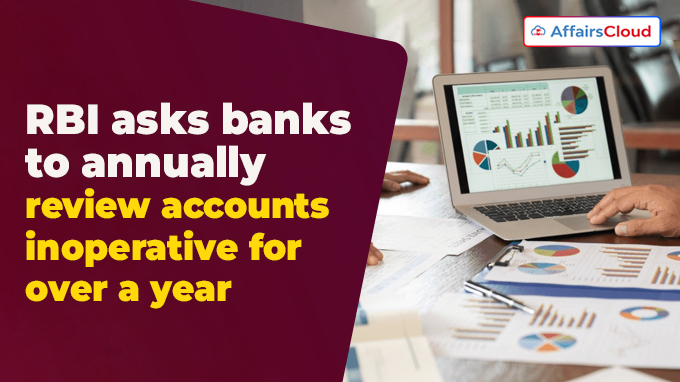 On January 1, 2024, the Reserve Bank of India (RBI) has issued revised guidelines for classifying accounts and deposits as inoperative accounts and unclaimed deposits by banks which will come into effect from April 1, 2024.
On January 1, 2024, the Reserve Bank of India (RBI) has issued revised guidelines for classifying accounts and deposits as inoperative accounts and unclaimed deposits by banks which will come into effect from April 1, 2024.
- These will be applicable to all Commercial Banks (including Regional Rural Banks/RRBs) and all Co-operative Banks.
These instructions by RBI are issued in exercise of the powers conferred by Sections 35A of the Banking Regulation (BR) Act, 1949 read with Sections 26A, 51 and 56 of the Act ibid and all other provisions of this Act or any other laws enabling RBI to issue instructions in this regard.
What is an inoperative account?
A savings or current account is treated as inoperative, if there are no customer induced transactions in the account for a period of over two years.
What are unclaimed deposits?
Balances in savings / current accounts which are not operated for 10 years, or term deposits not claimed within 10 years from date of maturity are unclaimed deposits.
Revised Instructions:
i.Unclaimed credit balances in bank accounts inactive for ten years or more, as per paragraph 3(iii) of the Depositor Education and Awareness (DEA) Fund Scheme, 2014, must be transferred to the RBI’s DEA Fund, following the provisions outlined in the DEA Fund Scheme, 2014.
ii.Comprehensive guidelines issued are to be followed by the banks regarding various aspects, including classifying accounts and deposits as inoperative or unclaimed, periodic review, fraud prevention, grievance redressal, and procedures for tracing customers, nominees, or legal heirs.
- These instructions aim to enhance ongoing efforts to reduce unclaimed deposits in the banking system and facilitate their return to rightful owners or claimants.
iii.Banks shall undertake atleast an annual review in respect of accounts, where there is no customer induced transactions for more than a year.
iv.Banks must notify account holders via letters, emails, or SMS (Short Message Service) on a quarterly basis if there’s been no activity in their accounts for the past year.
- Alerts should specify that the account will turn ‘inoperative’ without activity in the next year, requiring the account holder to submit fresh KYC documents for reactivation.
v.To classify an account as inoperative, only customer-initiated transactions, not bank-initiated ones, will be considered.
- Even if a customer has standing instructions (SI)/auto-renewal instructions with no other account activity, it will be treated as a customer-induced transaction.
- Bank-induced transactions include charges, fees, interest payments, penalties, and taxes initiated by the bank.
vi.To address inactivity of zero balance accounts for government scheme beneficiaries and students receiving scholarships, banks need to segregate these accounts in the core banking solution, exempting them from the ‘inoperative’ classification after two years of non-operation.
vii.The banks are not permitted to levy penal charges for non-maintenance of minimum balances in any account that is classified as an inoperative account.
- No charges shall be levied for activation of inoperative accounts.
vii.Banks regularly update and display unclaimed deposit details (names, addresses, Unclaimed Deposit Reference Numbers (UDRNs)) on websites or branches.
- Non-individual accounts show authorized individuals’ names but hide account number, type, balance, and branch.
viii.RBI mandates the availability of KYC updation for activation of inoperative accounts and unclaimed deposits at all branches (including non-home branches) and through video-customer identification process (V-CIP) if requested by the account holder
ix.No debit transactions allowed in inoperative accounts without customer-induced activation.
x.Banks provide activation details, forms on websites/branches, and conduct public awareness campaigns.
Click Here for Official Details
About DEA Fund:
The Banking Laws (Amendment) Act, 2012, Section 26A has been inserted in the BR Act, 1949 that empowers RBI to establish Depositor Education and Awareness Fund. Under this, all banks (Scheduled Commercial Banks including Regional Rural Banks and Local Area Banks /Urban Co-operative Banks / State Co-operative Banks /District Central Co-operative Banks) have been advised to transfer inoperative deposit accounts which have not been claimed or operated for a period of ten years or more or any deposit or any amount remaining unclaimed for more than 10 years to the Fund
- The guidelines for the same were issued by RBI in January 2015.
Click Here for more details about DEA Fund
RBI enhances bulk deposit limit for large UCBs 6.66 times to Rs 1 cr and above
RBI also revises Bulk Deposits limit for Scheduled Primary (Urban) Co-operative Banks in Tier 3 and 4 to Rs 1 crore and above from Rs 15 lakh and above. This is 6.66 times increase.
- The bulk deposit limit for urban co-operative banks not located in Scheduled UCBs in Tier 3 and 4 cities has been increased to Rs 15 lakh and above.
Key Point:
Previously, a deposit of Rs 15 lakh and above was considered a bulk deposit across all UCBs, allowing customers to negotiate interest rates with the banks. However, with the revised threshold set at ₹1 crore and above, customers depositing amounts below this limit will now earn a uniform rate of interest.
Types of UCB:
There are four types of UCBs:
Tier 1: Deposits up to Rs 100 crore
Tier 2: Deposits between Rs 100 crore and Rs 1,000 crore
Tier 3: Deposits between Rs 1,000 crore and Rs 10,000 crore
Tier 4: Deposits of over Rs 10,000 crore
Notes:
i.Tier 1 UCBs operating in a single district should have minimum net worth of Rs 2 crore. For all other UCBs, the minimum net worth should be Rs 5 crore.
ii.Tier 1 UCBs have to maintain a minimum capital to risk weighted assets ratio of 9% of Risk Weighted Assets (RWAs) on an ongoing basis.
- Tier 2 to 4 UCBs have to maintain a minimum capital to risk weighted assets of 12% of RWAs on an ongoing basis.
Recent Related News:
i.RBI revised its guidelines on categorizing the investments by banks, to align them with global standards by issuing RBI (Classification, Valuation and Operation of Investment Portfolio of Commercial Banks) Directions, 2023 which will be effective from April 1, 2024.
ii.RBI released the names of 15 Non-Banking Financial Companies (NBFCs) in the Upper Layer (UL)/NBFC-UL under Scale Based Regulation for NBFCs for the year 2023-24.
About Reserve Bank of India (RBI):
Governor – Shaktikanta Das
Deputy Governors – Swaminathan Janakiraman, Michael Debabrata Patra, M. Rajeshwar Rao, T. Rabi Sankar
Establishment – 1st April 1935
Headquarters – Mumbai, Maharashtra




